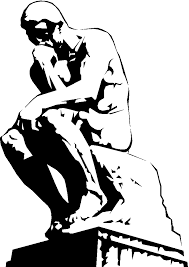
Apparently
Gregory finds my posts on Catholic doctrine to be misguided, and not worth his time until I correctly define the doctrines I'm contending with. At the same time, in poor debate form, Gregory offers no definitions of his own, so, in some crude, horizontal twist of
ultramontanism, I'm supposed to just believe him because he said so. How very Catholic.
More, it
seems that Gregory thinks my wife, Imogen, is a voice-piece for my concerns: "
Since she decided to weigh in on our discussion, I assumed you two must be working as a unit, and the adjective ['vitriol']
applied on both sides." Still, Gregory did "apologise" if this is not the case. But I can't help thinking that the maxim 'too little too late' applies nicely here. For why would Gregory even assume that my wife and I are incapable of thinking apart from each other? What measure of presumption leads a person to such a conclusion? And after admitting that he "...didn't have time to read all the way through. Read enough to get annoyed again, though", too! Fine measuring stick, Gregory: get annoyed at an article you haven't fully read, assume later that my wife and I are occupying the same voice, and then mete out a response? Poor form, my friend. Poor form.Let me be clear about Imogen's position, since you seem not to have understood from her writings themselves: she quite literally
does not care what definitions Catholicism wants to place on notions of impeccability, inerrancy, infallibility. That's her last concern, if it even is at all. She is not, never has been, and does not foresee ever being a Catholic, so she is not bound to whatever spin Catholicism wants to place on the words they choose.
What Imogen is concerned with is the lived-out reality of the Catholic Church, the people it effects, and the fact that billions of people are held in sway under a superstructure that enforces manditory beliefs. She's concerned about the intellectual tyranny of Catholicism, to put it in brief. She's concerned that the
Catholic Magisterium finds it a viable line of thinking to set out statements that are not only binding on
1.1 billion believers, but that there seems to be no recognition that in the face of
5.6 billion other people there may be a chance that Catholicism could have missed some understanding while it prattles endlessly about its absolutist doctrines.
What
I am concerned about is the fact that no matter how much the Catholic church is brought to task by concerned parties, if they are non-Catholics, they apparently don't understand. I'm sure that's probably true in a number of cases. However, I am equally sure it is not the case for everyone who has what they perceive as legitimate concerns.
This is where I charge Catholics, loosely, with
gnosticism. To be clear, however, Catholics are
not one of the historical groups of Gnostics. Catholics practice gnosticism by being a self-selected group that deny understanding to non-Catholics to the point that they are willing to assert that
they have "
the fulness of the faith",
the "
one true faith." The formal implications, of course, being that
all other non-Catholics are somehow deficient, under the captivity of lies, or unable to enjoy the same richness of faith and understanding unless somehow initiated (e.g.,
R.C.I.A.) into the rank-and-file of Catholics.
Nevermind that other churches are considered '
valid' (as if that hat-tipping concession really means anything useful at all); they are not as elevated, as close to God, as 'full' or 'near to the truth' as Catholics are. What kind of neurotic hubris goes before such snobbish bullshit, anyway? "Yes, you're Christians. But you're not as high a quality Christian as you would be if you bore the indelible stamp of our papally approved doctrines."
Nevertheless, from the time I started debating with Catholics, I've never witnessed a case where the non-Catholic is validated as understanding this-or-that Catholic proposition. As soon as a Catholic is pushed into a corner by force of another's concerns, the old Catholic stand-by is "you don't understand; your definitions are wrong; you can't understand because you're not Catholic." In other words, I'm concerned that the rampant
in-group/out-group mentality of the Catholic Church is belief by social pressure, not necessarily by a clear conscience and a willing conviciton.

More, the fact that Catholic beliefs are conscripted renders the beliefs of Catholics largely "belief in belief", to borrow
Daniel C. Dennett's term. I'm sure many Catholics sincerely believe Jesus was real, that he rose from the dead, and all that basic dogma. However, enforcing much more than that (e.g., the
assumption of Mary,
Extra Ecclesium nulla salus,
The Communion of the Saints, et al.) is a coercion of belief. That is, a Catholic cannot truly be Catholic unless s/he willingly takes on the convictions of a brace of dead people that declared this-that-or-another proposition true
because they believed it (i.e.,
Tradition). This degenerative reasoning process is, as I've pointed out before,
performative logic (what is said constitutes the thing referred to; or, what is said becomes its own proof, or point of reference).
So, the first and most important error in Catholicism is not that it declares certain of its doctrines free of error, but that it conscripts belief from a largely naive population of well-meaning Christians. The second error is that one of those conscripted beliefs is that Catholics are to believe in the belief that the Catholic Church never errs in matters of faith and morals. That, properly speaking, is not belief, but propaganda and
pretence.
Of course, people are free to not become Catholics (now) but they are still considered second-class Christians, which is the third error in the teachings of Catholicism, and it effectively equals bigotry. The same charge of bigotry can be levelled against almost all Christian denominations, so Catholicism is, in this instance, not uniquely isolated. However, Catholicism makes it a point to absolve itself of this error by immodestly claiming its inerrancy in matters of faith and morals, so it opens itself up to freethinking criticism, and cannot escape the attention given to this issue no matter how proficient it is at back-pedaling, splitting hairs, and jumping between literal and figurative meanings when it suits its interests, or serves its purposes.
Yes, we can modify the statement "without errors in matters of faith and morals" to read, as
Ed suggested, "
The Catholic Church has never, can never, and will never err in HER OFFICIAL TEACHING ON matters pertaining to faith and morals," but that does next to nothing to alleviate the spuriousness of such a claim. As Ed continued to note, the Catholic Church considers certain teachings to have a special status. But so what? So they are claimed to have a special status. This simply implies the notion of a
hierarchy of truths in Catholicism, which is purely notional and not demonstrable as actual.
And the fact that truths are ranked by some pre-determined levels of certainty (hierarchy of truths) requires that the stated case that there is a hierarchy of truth would form the ultimate truth about truth, the ultimate certainty about certainty. That is another reason for that particular teaching to be held in suspicion: truths of that magnitude, that is, truths that are so truly true that they are undeniable would be self-evident, one might reasonably assume. Kind of like noting that everyone dies: it's simply obvious and undeniable. The immaculate conception of Mary? Not so much. It's simply propositional, and then somewhere along the line of Catholic hermeneutic convolutions it becomes performative. I don't buy that kind of rigorous nonsense, no matter how neatly packaged in fancy rhetoric it is.
Which brings us back to Gregory's desire for me to define the terms I take difference with: impeccability and infallibility. And unless I use the Catholic doctrinal definitions, what I have to say is not worth his time. Why? Because unless I do that, I am apparently setting up a
straw man argument. Very well then, here are your church's definitions:
- Infallibility: "In general, exemption or immunity from liability to error or failure; in particular in theological usage, the supernatural prerogative by which the Church of Christ is, by a special Divine assistance, preserved from liability to error in her definitive dogmatic teaching regarding matters of faith and morals."
- Impeccability: On this point, I admit that I confused infallibility with impeccability (sinlessness) when I was criticizing the errors of the Catholic church, even after I made note that they are often confused. I suppose that is a truth now proved. What is more, I cannot find any reliable sources (at this point) that lay out a concise Catholic definition of impeccability. So, I offer Wikipedia's definition.
Nevertheless, my contentions about the claim that the "Catholic Church, in her official teachings, has never, can never, and will never err" remain. Especially concerning "can never" and "will never", for unless such sophistry is divine prophesy, the Catholic church simply has no place to spout such trumpery.
What is more, I reject and utterly refuse the notion of impeccability being a quality of Mary, as do some Catholic theologians. It is a quirky irony that Catholicism condemned Pelagianism (people in co-operation with divinely revealed truths can live without sin), but allowed that Mary was able, thr ough her co-operative will, to avoid sinning. Why condemn the one, but allow the other? And even if we consider the official teaching of the Magisterium that Mary was 'preserved' from sin by a special dolloping of grace, even at the time of her conception, we are left with the question, 'Why would he kill his son to save the rest of us, when it is at least anecdotally clear that he could've just tweaked the grace-factor in everyone's favour to begin with?' It seems from that that either God is a sadist, or the Catholic Church is wrong. In this case, I'm willing to wager on the latter.
ough her co-operative will, to avoid sinning. Why condemn the one, but allow the other? And even if we consider the official teaching of the Magisterium that Mary was 'preserved' from sin by a special dolloping of grace, even at the time of her conception, we are left with the question, 'Why would he kill his son to save the rest of us, when it is at least anecdotally clear that he could've just tweaked the grace-factor in everyone's favour to begin with?' It seems from that that either God is a sadist, or the Catholic Church is wrong. In this case, I'm willing to wager on the latter.
In the end, however Gregory decides to respond, he still has his work ahead of him. My criticisms are still the same despite the confusion in terms I admitted. In fact, they are more pressing for the occasion. Catholicism, as I have observed, has erred, continues to, and will probably carry-on erring as long as it holds to the mixed up teachings it currently enjoys.
 Does it ever occur to you to be entirely random? Does such a notion defeat the point: plan to be random? Part of me wonders if that's what happened when people started dreaming along lines of what we now understand as 'religion'. I think there was a measure of spontaneity involved in the philosophic meanderings on reality that easily makes a lateral step into religion.
Does it ever occur to you to be entirely random? Does such a notion defeat the point: plan to be random? Part of me wonders if that's what happened when people started dreaming along lines of what we now understand as 'religion'. I think there was a measure of spontaneity involved in the philosophic meanderings on reality that easily makes a lateral step into religion.


 And for those single folk out there, I extend you my sympathy, though it comes with a caveat: you're not incomplete because you don't have a partner to share the social Mary-Kay application of Valentine's day. You're whole on your own, and you don't need to take on the false shame and guilt the popular media and marketters are broadcasting to you.
And for those single folk out there, I extend you my sympathy, though it comes with a caveat: you're not incomplete because you don't have a partner to share the social Mary-Kay application of Valentine's day. You're whole on your own, and you don't need to take on the false shame and guilt the popular media and marketters are broadcasting to you.











